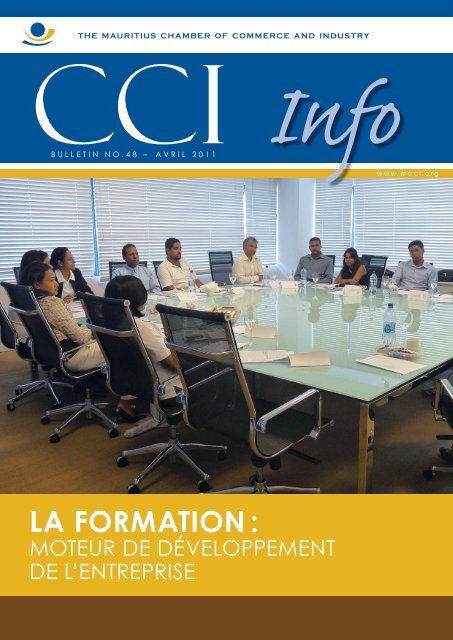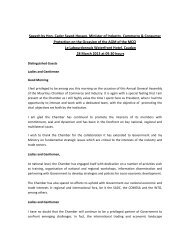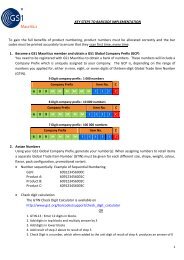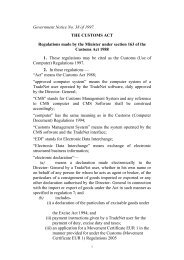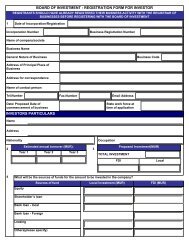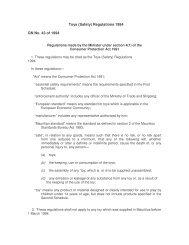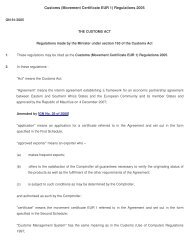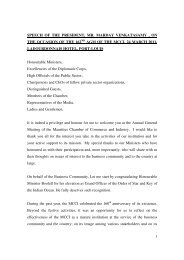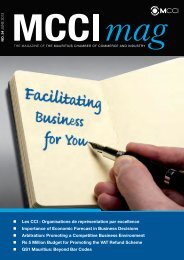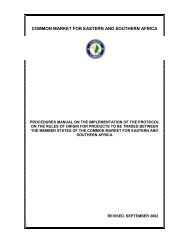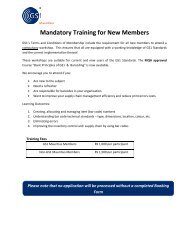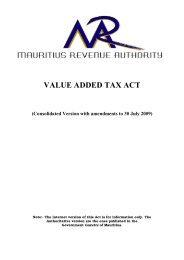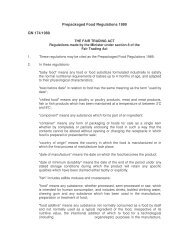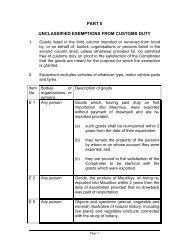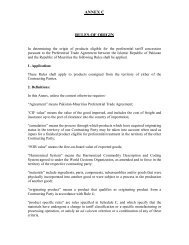LA FORMATION : - The Mauritius Chamber of Commerce and Industry
LA FORMATION : - The Mauritius Chamber of Commerce and Industry
LA FORMATION : - The Mauritius Chamber of Commerce and Industry
- No tags were found...
You also want an ePaper? Increase the reach of your titles
YUMPU automatically turns print PDFs into web optimized ePapers that Google loves.
BULLETIN NO.48 – AVRIL 2011<strong>LA</strong> <strong>FORMATION</strong> :MOTEUR DE DÉVELOPPEMENTDE L’ENTREPRISE
OUVERTURE ETMODERNISMEEDITOCÉDRIC DE SPÉVILLE – PrésidentAu lendemain de l’Assemblée Générale Annuelle de notreinstitution, il convient de s’arrêter un instant pourprendre la mesure des chantiers qui nous attendenten 2011.L’année 2011 sera sans nul doute pleine de challenges etde promesses.Les challenges sont nombreux. Les contrecoups de la criseéconomique internationale continuent de se faire sentir, et nosentreprises peinent a retrouver le dynamisme nécessaire pour assurerune croissance solide. Nous sommes loin d’une surchauffede l’économie mauricienne, et pourtant les chiffres <strong>of</strong>ficiels aussibien que les prévisions d’inflation sont préoccupantes. Les solutionspour contrer cette inflation « cost push » essentiellementimportée ne sont pas directes, et l’efficacité d’un durcissementde la politique monétaire – avec ses effets indésirables sur lescoûts d’investissement et la valeur de la roupie – reste à prouver.Nous devons rester vigilants et tenir le cap. C’est la fermetéavec laquelle nous repousserons les solutions de facilité quifera la différence. Si nous avons su garder tant bien que malla tête hors de l’eau c’est grâce à la cohérence de la politiqueréformatrice engagée par les secteurs privés et publics depuisplusieurs années. Les principes de base d’une économie juste,mettant en avant la libre entreprise dans un cadre réglementaireapproprié doivent continuer de prévaloir. Les réelles solutionsaux problèmes doivent être structurelles et nous ne pouvonsfaire l’impasse sur la nécessité d’un développement économiquecontinu, le plus inclusif et juste possible.Dans cet environnement toujours plein de défis, la MCCItiendra ses promesses.Notre institution continuera ses efforts pour accompagnerles entreprises locales aussi bien que les décideurs et autoritéscompétentes sur tous les fronts. Sur le plan régional, nous nousengageons avec force pour continuer le renforcement des relationsRéunion – Maurice initiées par les institutions du secteurprivé des îles sœurs et vigoureusement soutenues par nos politiques.Dans la même veine, la conclusion des APE (Accords dePartenariat Economique avec l’Union Européenne) avant décembre2011 doit figurer au premier plan de nos préoccupations.Finalement, nous suivons avec un intérêt particulier la situationdans la gr<strong>and</strong>e île, et espérons être témoins d’une sortie de criserapide.De même, la MCCI continuera de jouer un rôle prépondérant,avec ses partenaires, dans la mise en place des infrastructureset systèmes informatiques modernes qui améliorerontla compétitivité de nos entreprises. Je fais ici allusion auxplates-formes MNS (<strong>Mauritius</strong> Network Services Ltd) et MACCS(<strong>Mauritius</strong> Cargo Community System), ainsi qu’au système déjàopérationnel TTRS (Tourist Tax Refund System) mis en place parla MCCI en complément d’outils existants et a venir.2011 préparera la mise en place de la nouvelle constitutionde notre institution, votée à l’unanimité lors de l’AssembléeGénérale Extraordinaire tenue le 24 Mars dernier. Cettenouvelle constitution assurera une meilleure représentativité desdifférents secteurs de l’économie mauricienne au conseil de laMCCI. Aussi, l’augmentation du nombre de sièges au conseil(de 17 a 21) permettra une rotation plus fréquente des membres, pourplus d’ouverture et d’accessibilité. Finalement, les structures et souscomitésen place continueront de soutenir les valeurs fortes de notreinstitution que sont la transparence et la bonne gouvernance.En parallèle, nous verrons la concrétisation de l’exercicede rebr<strong>and</strong>ing initié sous la présidence de Marday Venketasamy.Cet exercice nous aura permis de mieux appréhender les attentesde nos stakeholders dans tous les domaines d’opération de laMCCI, tout en identifiant les points de discordance existants entrel’image voulue de notre institution et l’image projetée. Nousprocéderons, dans les mois qui viennent, a une campagne decommunication ciblée pour nous assurer de passer un messageclair et simple a toutes nos parties prenantes.La continuité de l’action de la MCCI, depuis plus de 160 ans,a donné sa force et sa crédibilité à notre institution. Mon rôle,en tant que nouveau président, sera d’assurer avec les membresdu conseil et le management la permanence de nos actions etde nos politiques, en contact permanent avec nos Membres, lesautorités, le JEC et les associations du secteur privé. Continuonsd’accomplir notre mission avec force: “To serve <strong>and</strong> promotethe interests <strong>of</strong> the business community in playing a leadingrole in the economic development <strong>of</strong> <strong>Mauritius</strong>.” ■CCI INFO BULLETIN NO. 48 AVRIL 2011 1
• BTS Gestion PME-PMI• BTS Management desUnités Commerciales• BTS Services Informatiquesaux Organisations• DU Comptabilité Finance• Licence de Gestion• Master ManagementInternational• Master Administrationdes EntreprisesInscrivez-vous dès maintenant.Chambre de <strong>Commerce</strong> etd’Industrie de MauriceCentre d’Etudes SupérieuresMEF-MCCI Building, Ebène CybercitéTél : 454 8950 • Fax : 454 8960www.etudes-superieures.orginfo@etudes-superieures.org
ECONOMY
NORMESLES PRINCIPES DE <strong>LA</strong> RÉGLEMENTATIONHAMID JHUMKA – Manager, <strong>Industry</strong> DivisionDans un rapport sur la restructurationdu MSB qui date de 2004,le Consultant Martin Kellermanavait souligné le rapport étroit qu’ilconvient d’observer entre les règlements et lesnormes, et avait recomm<strong>and</strong>é la mise en placed’un cadre approprié susceptible non seulementd’aider à la réalisation progressive dece principe, mais aussi d’initier une reforme àlong terme de la réglementation. Plus récemment,avec la collaboration de Mme Marie-Christine Radonde, de l’Asssociation Française deNormalisation (AFNOR), un texte a été proposépour l’introduction d’un National TechnicalRegulatory Framework Act et la création d’unConseil d’Administration. Le fait que ce projetsoit piloté par le MSB laisse probablementsupposer qu’il s’agit essentiellement d’unequestion d’ordre administrative et techniquerelevant particulièrement de la compétencede cette institution. Une telle supposition estcapable de minimiser tout l’intérêt que ce projetdevrait susciter. En réalité il concerne tous lesacteurs du développement socio-économique.Car l’objectif de la réforme, en venant complémenterla politique budgétaire, est de renforcerla structure socio-économique et sa capacitéd’adaptation au changement.En vue de sensibliser la communauté des affairesà cette question complexe nous reproduisons cidessousdes extraits d’un document de l’OCDEsur les principes directeurs pour la qualité et laperformance de la réglementation.Engager la réforme de la réglementation auniveau politique le plus élevé, en reconnaissantque les éléments clés de la politiqueréglementaire – mesures, institutions et instruments– doivent être considérés commeun tout et appliqués à tous les niveauxd’administration. Expliquer clairement aupublic les objectifs, les stratégies et lesavantages des réformes.Une réglementation de qualité devrait :(i) répondre à des objectifs clairement définis etêtre efficace pour la réalisation de ces objectifs;(ii) procurer des avantages qui justifient lescoûts, compte tenu à la fois de la répartitiondes effets dans l’ensemble de la collectivité etde l’impact économique, environnemental etsocial ; (iii) engendrer le moins possible de coûtset de distorsions sur le marché ; (iv) promouvoirl’innovation au moyen des mécanismesd’incitation du marché et d’approches fondéessur des objectifs ; (v) être claire, simple et pratiquepour les utilisateurs ; (vi) être cohérenteavec les autres réglementations et politiques et(viii) être compatible autant que possible avec lesprincipes qui visent à faciliter la concurrence, leséchanges et l’investissement.Créer des mécanismes de coordinationefficaces et crédibles, veiller à la cohérence desgr<strong>and</strong>s objectifs. Faire en sorte que les cadresinstitutionnels soient adéquats et les ressourcessuffisantes, et que des systèmes soient en placepour gérer efficacement les ressources réglementaireset exécuter les missions d’application.Eviter les chevauchements de compétencesentre les autorités réglementaires et les niveauxd’administration.Adopter une approche dynamique pourl’amélioration des systèmes réglementaires aufil du temps en s’attachant au volume des réglementationsen vigueur et à la qualité des nouvellesréglementations, et faire en sorte que lesréformes soient exécutées dans un ordre logiqueet que les marchés qui sont liés soient libéralisésensemble si cela est possible. Tirer pleinementparti de l’évaluation ex post.Étudier des substituts à la réglementation,notamment l’auto-réglementation, quidonneront plus de latitude aux particuliers etaux entreprises ;Procéder à une évaluation des instruments etinstitutions réglementaires fondée sur la performancepour déterminer dans quelle mesureils contribuent efficacement à une bonneréglementation et aux résultats économiques, etpour évaluer leur rapport coût-efficacité.Axer le réexamen sur les réglementationsdont la réforme produira les avantages les plusimportants et les plus visibles, en particuliersur celles qui restreignent la concurrence etl’ouverture des marchés et sur celles qui affectentles entreprises, notamment les PME.Veiller au respect des normes de qualité.Intégrer l’analyse d’impact de la réglementationdans l’élaboration, le réexamen et la réforme desréglementations importantes.1. Consulter toutes les parties concernées,Faire en sorte que les entreprises d’un secteurne bénéficient pas d’avantages particuliers oune supportent pas des coûts particuliers du faitd’une réglementation.S’assurer que les procédures administrativesd’application des réglementations et les décisionsréglementaires soient transparentes et nondiscriminatoires, comportent un mécanismede recours contre les décisions individuelles etne retardent pas inutilement les décisions desentreprises ; veiller à l’existence de voies derecours efficaces.Dans un souci de cohérence, l’application dudroit de la concurrence et la réglementationsectorielle qui vise à promouvoir la concurrenceet la libéralisation des échangesdevront être coordonnées.Faire respecter énergiquement le droit de la concurrencelorsque la collusion, l’abus de positiondominante, ou une fusion anticoncurrentielle oumonopolistique peuvent compromettre la réussitede la réforme.Œuvrer à l’élaboration et à l’utilisation denormes harmonisées au niveau internationalÉlaborer des critères clairement définis pourl’équivalence des normes.Ces extraits, très loin d’être exhaustifs, nousdonnent un aperçu des principes de laréglementation dans une économie moderne.La réglementation est mise au service dudéveloppement, celui des PME en particulier.Elle n’est pas une fin en soi. Elle n’est pas unestructure rigide et contraignante. L’évaluationde l’impact de la réglementation est nécessaireafin de trouver ce qui convient le mieux àl’économie. Sans aucune ambiguïté, on peut direque cette approche contraste fortement avec lesrègles de l’OMC, ou du moins avec la façon dontnos dirigeants les conçoivent. En effet on peut estimerque celles-ci sont considérées comme unefin en soi, sans aucune analyse contradictoire,sans aucune évaluation ex post, négligeant toutsimplement sa cohérence avec notre politiqueindustrielle et le développement des PME, etcela malgré ces effets dévastateurs sur notre tissuindustriel, notamment le secteur de la confection,la menuiserie, la chaussure, la bijouterie etl’artisanat.La lecture des principes de l’OCDE nous montrebien qu’il faut éviter tout dogmatisme, et toujoursavoir à l’esprit que l’objectif de la réglementationest le développement socio-économique. Il noussemble que l’état d’esprit qui prévaut chez nosdécideurs à divers échelons est loin de correspondreà la philosophie qui sous-tend ces principes.Cette faiblesse est encore plus manifestesi on étend le concept de la réglementationà d’autres mesures de politique industriel etcommercial. En nous inspirant de ces princpes, etdébordant du cadre restreint de la réglementation,nous pensons qu’il ne faut pas avoir peurde remettre en question certaines politiques calquéessur le modèle du monde développé si onconstate que les effets négatifs l’emportent surles effets positifs. Cette approche dynamique estcelle qui est priviligiée par les pays développéset émergents. ■6CCI INFO BULLETIN NO. 48 AVRIL 2011
<strong>LA</strong> <strong>FORMATION</strong> :MOTEUR DEDÉVELOPPEMENTDE L’ENTREPRISE<strong>FORMATION</strong> ET TRANSMISSION DES SAVOIRSDans l’optique de développer des compétences en entreprise,il devient de plus en plus important de gérer les savoirs etsavoir-faire, qu'ils soient individuels ou collectifs. Contribuer àla création de valeur, considérer les processus d’apprentissagecomme un avantage concurrentiel, que l’intelligence collectivesoit une réalité, tels sont les défis de la formation aujourd’hui.L’environnement de l’entreprise mauricienne est marqué par une forte orientation vers lemarché international à travers la conclusion de plusieurs accords de libre-échange avecbeaucoup de pays. De même, l’entreprise se trouve confrontée à un environnementfortement concurrentiel et hautement dominé par les nouvelles technologies.Le développement de l’entreprise nécessite la mobilisation des capitaux dont elle dispose ainsique celle des compétences humaines, vu leur importance dans l’amélioration de la productivitéet la compétitivité de l’entreprise mauricienne. Consciente de cet état de fait, cette dernière estamenée à valoriser ses ressources humaines en les considérant comme une variable stratégiquedans le développement de l’entreprise.CCI INFO BULLETIN NO. 48 AVRIL 2011 7
<strong>FORMATION</strong> ET TRANSMISSION DES SAVOIRS<strong>LA</strong> <strong>FORMATION</strong> :MOTEUR DE DÉVELOPPEMENTDE L’ENTREPRISEASHRAF JOOMUN – Directeur, Centred’Etudes Supérieures, MCCIParmi les outils et les modalités de valorisation des ressourceshumaines, on trouve la formation. Considérée comme élémentaire,elle a fait la question des différentes actions de soutien etd’appui qu’elles soient locales ou internationale.Pour démontrer l’importance de la formation dans ledéveloppement de l’entreprise, nous allons essayer à travers cepropos de répondre à la problématique suivante :Comment la formation des ressources humainesinflue sur le développement de l’entreprise ?Pour répondre à cette problématique, nous allons traiterles sous-questions suivantes :• Quel est l’objectif de la formation ?• Quelles sont ses méthodes ?• Comment la formation se pratique t-elle ?• Quel est l’impact de la formation sur lesperformances sociales de l’entreprise ?• Quel est l’impact de la formation sur lesperformances économiques de l’entreprise ?• Comment peut-on réussir une action de formation ?I – <strong>FORMATION</strong> : CONCEPT ET PRATIQUESValoriser une ressource c’est lui donner une valeur, la considéreret la reconnaître en tant que facteur essentiel pour toutdéveloppement.La formation est un moyen de valorisation des ressourceshumaines et constitue l’investissement le plus expérimentépour augmenter le stock de connaissance pr<strong>of</strong>essionnelle dessalariés, de diminuer le risque lié à l’inadéquation entre besoins etexigences du marché de travail et d’accompagner le changementet l’instabilité de l’environnement.1 : la conception de la formationa). ImportanceLa formation du personnel constitue un enjeu qu’aucune entreprisene peut laisser à part, elle est l’un des instruments quipermet d’obtenir le niveau de flexibilité nécessaire en assurantla polyvalence du personnel et en développant sa capacitéd’adaptation pour faire face aux changements et aux avancementtechnologiques..La formation doit être vue comme un moyen de développementéconomique et social. Elle contribue à l’amélioration de laquantité et de la qualité du travail fourni, à la motivation par lespossibilités de promotions <strong>of</strong>fertes.En outre, elle représente une activité rentable qui s’inscritdans le temps pour la pérennité de l’entreprise. Donc développerles compétences contribue à faire de l’élément humain unfacteur clé de succès.Le processus de la formation repose sur l’identification desbesoins, la conception du programme et l’exécution de l’action.En outre, le système est alimenté par les ressourcesindividuelles telles l’aptitude, la volonté ou la disponibilité pourconduire à la réalisation des objectifs individuels, notamment ledéveloppement du savoir et le savoir- faire, ainsi que les objectifsorganisationnels soient l’acquisition des compétences, le développementd’une culture ou la valorisation collectiveLe système de formation se trouve influencé parl’environnement interne (politique et stratégie, systèmes degestion recrutement, promotion, rémunération…) et externe(législation, politiques économiques, évolution socioculturelle…).D’où, une évolution est faite en vue d’éventuels ajustements.b). les objectifs de la formationL’apprentissage constitue le principal objectif de la formation,il décrit les capacités à acquérir au cours de la formation. Unetelle opération doit prendre en considération les objectifssuivants :• Adaptation de la main-d’œuvre aux postesactuellement occupés• Le développement de la mobilité, c’est-à-direla préparation du personnel à des promotionsou à des conversions internes et externes• Le développement des outils intellectuelsde base (formation générale, raisonnementlogique, outils de prise de décision…)• Le développement d’une culture de l’entreprisec). la typologie de la formationA. PARADAS1 distingue une typologie d’objectifs de formationselon deux dimensions : évolution de la mission (savoir satisfaire)et évolution du métier (savoir-faire) :8CCI INFO BULLETIN NO. 48 AVRIL 2011
<strong>FORMATION</strong> ET TRANSMISSION DES SAVOIRSavec des variables telles la productivité, la qualité, la rentabilité,la compétitivité…et de ses liens avec la stratégie de l’entreprise.Cette mutation se fera peu à peu une place dans lesentreprises de la région orientale, mais la majorité de ces entreprisesne sont pas convaincues de l’intérêt de la formation, poureux la formation n’est qu’une dépense faite à fonds perdu.Mais la formation devient un investissement lorsque :1 ) La formation est considérée comme un moyen et non plusune fin en soi : un investissement est toujours consenti enfonction des résultats qu’on attend à terme.2 ) La formation est au service de la stratégie de l’entrepriseà moyen terme. Cela signifie d’une part que le plan deformation mérite d’être pluriannuel et d’autre part que laformation n’est pas isolée : au même titre que les moyensorganisationnels, techniques, humains, financiers, ellecontribue à des changements d’ensemble qu’elle ne sauraitréaliser seule et qui ne pourraient se produire sans elle.3 ) Comme pour tout investissement, il est attendu des effetsà terme : il pèse donc sur elle une forme d’obligation derésultat et c’est en fonction des résultats atteints qu’onpourra juger de sa rentabilité et ses effets. Se pose en toutcas le problème de l’évaluation rigoureuse de la formation,problème posé en termes d’efficacité et de rentabilité del’investissement consenti.4 ) Devenue un enjeu important, la formation ne saurait êtredurablement livrée à l’empirisme et à l’intuition : il luifaut devenir efficiente, c’est-à-dire optimiser son proprefonctionnement et les moyens qu’elle utilise. Pour cela, elledoit devenir systémique, se pr<strong>of</strong>essionnaliser, rationaliserses dépenses. Apparaît alors la nécessité d’une véritableingénierie de la formation.b). Ingénierie de la formation.L’ingénierie de la formation est un « ensemble coordonné destravaux méthodiques de conception et de réalisation des systèmesde formation », elle est l’aboutissement méthodologique de l’idéede formation investissement : elle correspond à la démarche parlaquelle un responsable de formation doit passer pour espérerêtre crédible comme gestionnaire à part entière.L’ingénierie de la formation comprend quatre étapes, danslesquelles on trouve neuf phases :1 ) Tout d’abord, il y a l’étape de diagnostic.Elle comprend deux phases :∞ Le recueil de l’information : l’information peut venirde différentes sources : entreprise, salariés, clients,fournisseurs…, et domaine stratégique, financier,organisationnel, équipements, personnel…∞ Analyse et contrats : dans cette phase on dresse un tableaud’ensemble de l’organisation, de ses forces et faiblesses,de ses dysfonctionnements, de ses dynamiques.2 ) Puis, il y a l’étape de décision quicomprend trois phases à savoir :∞ Concernent l’objectif d’évaluation, par laplanification à court, moyen et long terme.∞ connaître les actions à entreprendre en ce quiconcerne le recrutement, la formation, les structures,les investissements et les équipements.∞ dans cette Phase, nous déterminons les besoins deformation contribuant à l’évolution de l’entreprise.3 ) Ensuite, c’est l’étape de la mise en œuvrequi comporte trois phases :∞ c’est la création de l’<strong>of</strong>fre de formation dans uncahier de charges, en faisant des appels d’<strong>of</strong>fres, endéterminant les démarches d’achat de formation,et aussi le montage du plan, budgétisation,signature de conventions avec les prestataires.∞ communication de plan de formation, plaquettes,information par la hiérarchie, etc.∞ la réalisation du plan de formation, se fait toutd’abord, par la création de ce plan en mettant à joursles contenus, les supports, les méthodes d’animationde la formation. Ensuite, par le suivi et la gestion :inscription, calendrier, budget et dépenses, locauxet équipements de formation, intervenants.4 ) Enfin, on trouve l’évaluation comme dernièreétape, elle contient une seule Phase :∞ l’évaluation du plan.Evaluation des actions : satisfaction des participants,apprentissages divers, amélioration des comportements ensituation et des performances.Evaluation du plan : cohérence, pertinence, efficacité,efficience, acceptation, conformité, etc.Ce processus appelle quelques commentaires :• On constate que la démarche spécifique audomaine de la formation ne commence qu’aumoment de l’étape de la décision .• Ce diagnostic est large par ce qu’il a pour but d’éviter deuxécueils : à l’issue d’analyses trop restrictives et cloisonnées,à résoudre par la formation des problèmes auxquels elleapporte une réponse inappropriée ou, au contraire, ne paspenser à l’utiliser dans des situations où elle serait utile.CONCLUSIONLa formation est une variable fondamentale de la valorisationdes ressources humaines et la performance de l’entreprise. Nousremarquons une augmentation de l’intérêt porté à la formation,mais cela reste insuffisant en comparant les entreprises pratiquantla formation par rapport à l’échelle des pays industrialisés.C’est pour cette raison qu’on doit sensibiliser plus les dirigeantssur la nécessité et l’importance de la formation, notamment àtravers des séminaires et des conférences. L’avancement effrénéde la technologie fait qu’aujourd’hui la formation régulière del’employé esr une nécessité au risque de tomber dans l’obsolète.L’employeur ne doit surtout pas considérer la formation commeune dépense mais plutôt comme un investissement à court etmoyen terme. ■BIBLIOGRAPHIEOuvrages∞ A.PARADAS «typologie de formation etdétermination des objectifs de la PME »∞ Jacques SOYER, « Fonction formation »,2e édition, Editions d’Organisations∞ T. DURANT, « L’alchimie de la compétence »∞ G. Le Boterf, « L’ingénierie et l’évaluation de laformation », Paris, Les éditions d’Organisation.CCI INFO BULLETIN NO. 48 AVRIL 2011 11
TRADEFifth round <strong>of</strong> negotiationsfor the Free Trade Areabetween <strong>Mauritius</strong><strong>and</strong> Turkey.Second from left: Mr. Cemalettin Damlaci – Deputy Undersecretaryfor Foreign Trade <strong>and</strong> Head <strong>of</strong> Turkish Delegation, during thebilateral negotiations in <strong>Mauritius</strong> in January 2011.Workshop on the newTrade (Anti-dumping<strong>and</strong> CountervailingMeasures) ActFrom left to right: Mr. M. Venkatasamy – President <strong>of</strong> the MCCI,Mr. Marius Bordalba – Consultant, BKP Research <strong>and</strong> Consulting,Hon. Dr. A. Boolell – Minister <strong>of</strong> Foreign Affairs <strong>and</strong> InternationalTrade, Mr. S. Boodhoo – Deputy Director, Trade Policy Unit.■ <strong>The</strong> Fifth Round <strong>of</strong> bilateral negotiations for the setting up<strong>of</strong> a Free Trade Area (FTA) between <strong>Mauritius</strong> <strong>and</strong> Turkey washeld in <strong>Mauritius</strong> on 17-19 January 2011. <strong>The</strong> setting up <strong>of</strong> aFTA between <strong>Mauritius</strong> <strong>and</strong> Turkey is being guided by bothcountries’ trade agreements with the European Union (EU)<strong>and</strong> is expected to significantly enhance trade between thetwo countries.Since the beginning <strong>of</strong> the negotiations, the MCCI has beenactively involved in the discussions <strong>and</strong> participating in all theround <strong>of</strong> negotiations held in <strong>Mauritius</strong> <strong>and</strong> in Turkey. <strong>The</strong>Fifth Round <strong>of</strong> negotiations focused mainly on the outst<strong>and</strong>ingprovisions <strong>of</strong> the draft FTA text <strong>and</strong> the market access <strong>of</strong>fers<strong>of</strong> both countries. Turkey has proposed duty-free <strong>and</strong> quotafreeaccess on all industrial products as from the date <strong>of</strong> entryinto force <strong>of</strong> the agreement, except for a list <strong>of</strong> sixty clothingitems on which duties will be phased down over a period <strong>of</strong>four years. For products from the agro-industry, <strong>Mauritius</strong> hasobtained concessions on a list <strong>of</strong> products which includes cutflowers, vegetables, pasta, preserved tuna <strong>and</strong> sweet biscuits.As regards to the Mauritian <strong>of</strong>fer, a tariff phase-down schedulesimilar to the Economic Partnership Agreement (EPA) withthe EU was proposed to Turkey <strong>and</strong> a list <strong>of</strong> sensitive products,which would be excluded from the tariff liberalisation process,was also submitted. On the rules <strong>of</strong> origin, it was agreed thatthe EPA rules would be applied <strong>and</strong> that provisions for bothcountries to cumulate origin with the EU would be included.It is expected that the signing <strong>of</strong> the FTA between both countrieswill occur after the comprehensive document has beenapproved by both Governments.■ With the on-going trade liberalisation process, the MCCIhad been constantly advocating the need to have a nationaltrade remedy legislation to deal with dumping <strong>and</strong> other unfairtrading practices. <strong>The</strong> Trade (Anti-dumping <strong>and</strong> CountervailingMeasures) Act was enacted on 30 March 2010 with themain objective <strong>of</strong> providing the local industry with the necessaryrecourse against the injurious effects <strong>of</strong> unfair trade practicessuch as dumping <strong>and</strong> subsidies.In the context <strong>of</strong> the implementation <strong>of</strong> the new Trade (Antidumping<strong>and</strong> Countervailing Measures) Act, the Ministry <strong>of</strong>Foreign Affairs, Regional Integration <strong>and</strong> International Tradein collaboration with the European TradeCom Facility <strong>and</strong> theMCCI, organized a workshop on 15-16 November 2010 tosensitise private sector operators on the provisions <strong>of</strong> the newlegislation.<strong>The</strong> objective <strong>of</strong> the workshop was to apprise the businesscommunity on the main provisions <strong>of</strong> the law <strong>and</strong> the proceduresto be followed for filing an application for investigation.Guidelines for filing complaints against dumping <strong>and</strong> subsidieswere prepared to facilitate the underst<strong>and</strong>ing <strong>of</strong> the law <strong>and</strong> toguide the private sector operators in submitting their applications.<strong>The</strong> questionnaires to be filled to initiate investigation aswell as the information <strong>and</strong> data required were explained. <strong>The</strong>participants also had the opportunity to look at practical casestudies in other countries.All the guidelines <strong>and</strong> questionnaires for filing a complaintare available on the MCCI’s website: www.mcci.org ■VIVAGEN AMOOMOOGUM – Analyst, Trade Division14CCI INFO BULLETIN NO. 48 AVRIL 2011
TRADESTUDY ON AN ELECTRONIC SYSTEM FORTHE SUBMISSION OF TRADE DOCUMENTSVIVAGEN AMOOMOOGUM – Analyst, Trade DivisionFrom left to right: Mrs. D. Lim How – Consultant, Mr. M. Cheeroo – Secretary General (MCCI), Hon. T. Pillay Chedumbrum – Minister <strong>of</strong> Information <strong>and</strong> CommunicationTechnology, Mr. M. Venkatasamy – President (MCCI), Mr. Ibrahima Diagne – Consultant, Mr. P. Sauvage, Mrs. R. Narrainen – Manager, Trade Division (MCCI).Trade facilitation has now become a key measure <strong>of</strong> thecompetitiveness <strong>and</strong> viability <strong>of</strong> businesses. For theMCCI, trade facilitation has always been among one <strong>of</strong>our top priorities <strong>and</strong> we have been working with variouspartners <strong>and</strong> stakeholders both in <strong>and</strong> outside <strong>Mauritius</strong> t<strong>of</strong>acilitate trade <strong>and</strong> reduce the cost <strong>of</strong> doing business. <strong>The</strong> MCCIhas been involved in several trade facilitation projects <strong>and</strong> one<strong>of</strong> the main initiatives in 2010 was the commissioning <strong>of</strong> a studyto establish the requirements for the setting up <strong>of</strong> an electronicplatform for the submission <strong>of</strong> trade documents. <strong>The</strong> study wasfunded by the European TradeCom Facility.<strong>The</strong> main objective <strong>of</strong> this project was to look at therequirements for moving towards ‘Paperless Trade’, whichinvolves the setting up <strong>of</strong> a ‘Single Window’ to provide a singleentry point to fulfill all import, export <strong>and</strong> related regulatoryrequirements with all information being submitted electronicallyonly once to all agencies. <strong>The</strong> ‘Single Window’ would link theCustoms Authorities, all licensing <strong>and</strong> certification agencies,all actors involved in logistics (both port <strong>and</strong> airport), issuingbodies for certificates <strong>of</strong> origin, commercial banks, onto oneintegrated platform with the possibility <strong>of</strong>, eventually, being ableto conduct cross-border transactions electronically.<strong>The</strong> study highlighted that, although there were currentlyseveral IT platforms <strong>and</strong> other sub-systems for the electronicsubmissions <strong>of</strong> trade documents, some transactions werestill being performed manually <strong>and</strong> full interoperability betweenthe existing platforms had not yet been achieved. <strong>The</strong>study also showed that business people, who use the variousservices, expected a more integrated approach from thevarious departments, which would improve the processing <strong>of</strong> theirtransactions without adding to the current cost <strong>of</strong> the services.<strong>The</strong> study also reviewed the experiences <strong>of</strong> Singapore,South Korea <strong>and</strong> Sweden, in the implementation <strong>of</strong> paperlesstrade. One <strong>of</strong> the main observations was that the successful implementation<strong>of</strong> a single window facility required the commitmentat highest political level to support the substantial reformsneeded in the various Ministries <strong>and</strong> agencies concerned.A workshop was organised by the MCCI to present thefindings <strong>of</strong> the study to all stakeholders, including high <strong>of</strong>ficialsfrom different Ministries, Customs Department <strong>and</strong> <strong>Mauritius</strong>Port Authority, amongst others. In his opening speech, theMinister <strong>of</strong> Information <strong>and</strong> Communication Technology, Hon.T. Pillay Chedumbrum, gave the assurance <strong>of</strong> the full support <strong>of</strong>his Ministry in the implementation <strong>of</strong> the project. <strong>The</strong> differentoptions for the setting up <strong>of</strong> a single window in <strong>Mauritius</strong> werepresented with an analysis <strong>of</strong> the organisational, structural, legal<strong>and</strong> technical requirements. ■CCI INFO BULLETIN NO. 48 AVRIL 2011 15
BUSINESS FACILITATIONREINFORCING THE ICT SECTORIN THE INDIAN OCEANAnjana Chikhuri – Analyst, Legal <strong>and</strong> Business FacilitationParticipation <strong>of</strong> OTAM, MCCI <strong>and</strong> GOTICOM at a workshop on capacity building held in <strong>Mauritius</strong>.Under the initiative <strong>of</strong> the Legal <strong>and</strong> Business FacilitationDivision, the <strong>Chamber</strong> has benefited recently from aProinvest-funded project aimed at reinforcing the ICTsector in the Indian Ocean Region, <strong>and</strong> more particularlyin <strong>Mauritius</strong> <strong>and</strong> Madagascar. <strong>The</strong> <strong>Chamber</strong> collaborated withGOTICOM (Groupement des Opérateurs TIC de Madagascar) onthis project <strong>and</strong> also involved OTAM (Outsourcing <strong>and</strong> TelecommunicationsAssociation <strong>of</strong> <strong>Mauritius</strong>), the main ICT sectoral association<strong>of</strong> <strong>Mauritius</strong>. <strong>The</strong> objectives <strong>of</strong> the project which endedMarch 2011were to improve the quality, relevance <strong>and</strong> diversity<strong>of</strong> services <strong>of</strong>fered to ICT sector at 3 levels: 1. Public-private sectordialogue 2. Business development services 3. Inter-enterprisecooperation.In the context <strong>of</strong> the project, representatives <strong>of</strong> the MCCI<strong>and</strong> OTAM took part in business missions to Madagascar toidentify potential areas <strong>of</strong> cooperation <strong>and</strong> business opportunities.<strong>The</strong> delegation had meetings with representatives <strong>of</strong> theEconomic Development Board <strong>of</strong> Madagascar, the Ministry <strong>of</strong>Telecommunications <strong>and</strong> the Ministry <strong>of</strong> <strong>Commerce</strong> <strong>of</strong> Madagascar,<strong>and</strong> the OMERT (the ICT regulation agency <strong>of</strong> Madagascar).B2B meetings between the Mauritian <strong>and</strong> Madagascanoperators were also held.Further to the business mission <strong>and</strong> through an initiative<strong>of</strong> the <strong>Chamber</strong>, a Memor<strong>and</strong>um <strong>of</strong> Underst<strong>and</strong>ing was signedon 25 February between OTAM <strong>and</strong> GOTICOM. <strong>The</strong> two ICTassociations agree through this MoU to share their resources inview <strong>of</strong> promoting the development <strong>of</strong> the ICT sector in theIndian Ocean region. <strong>The</strong> MoU lays emphasis on training <strong>and</strong>human resources development, on improving the quality <strong>and</strong>efficiency <strong>of</strong> ICT services delivered in both countries <strong>and</strong> on thedevelopment <strong>of</strong> a common strategy for enhancing internationalcompetitiveness.MCCI <strong>and</strong> OTAM staffs also received training in the context<strong>of</strong> the project with a view to build capacity <strong>and</strong> develop skillsnecessary for improving the quality <strong>and</strong> diversity <strong>of</strong> servicesprovided to ICT operators. A major training partner was theEuropean Multimedia Forum, based in Brussels, <strong>and</strong> consideredas the main European trade association for promoting the competitiveness<strong>of</strong> the digital media industries in the global marketplace. Its main objectives are to facilitate contacts <strong>and</strong> knowledgeexchange, provide an international support network <strong>and</strong>encourage the expansion <strong>of</strong> European enterprises by enhancingtheir international visibility <strong>and</strong> their access to funding. Currently,the EMF counts more than 20 associations, organisations <strong>and</strong>clusters active in the information technology sector amongstits members. Jointly these entities form a network representingmore than 5000 digital technology & digital media companiesthroughout Europe <strong>and</strong> the world. <strong>The</strong> <strong>Chamber</strong> <strong>and</strong> OTAM willcontinue to work with the EMF in view <strong>of</strong> enhancing businesssupport services to the ICT sector.<strong>The</strong> ICT sector is expected to contribute significantly tothe economic development <strong>of</strong> <strong>Mauritius</strong> in the coming years, asit maintains promising results in terms <strong>of</strong> growth, contributionto GDP, <strong>and</strong> job creation. In 2010, value-added in the ICT sectorwas estimated at Rs 17.1 Billion <strong>and</strong> value added to GDP wasestimated at 6.1%. <strong>The</strong> growth rate in the sector was 13.6% <strong>and</strong>the number <strong>of</strong> large companies was 138, employing altogethersome 12,826 staffs. Aware <strong>of</strong> the importance <strong>of</strong> this sector, the<strong>Chamber</strong> remains committed to provide its support <strong>and</strong> servicesto the ICT business community. It works in close collaborationwith OTAM, the secretariat <strong>of</strong> which it has been hosting since2007. <strong>The</strong> <strong>Chamber</strong> is also represented on the ICT AdvisoryCouncil, <strong>and</strong> in order to enhance its representation <strong>of</strong> the sector,it will be amending its constitution this year to include a seat fora representative <strong>of</strong> the ICT sector on its council. ■16CCI INFO BULLETIN NO. 48 AVRIL 2011
LIGHT SERVICESOPEN UP TO SHOPSUNDER THEDEFERRED DUTYAND TAX SCHEMEInitial Charges(per shop)ADSL Modem Rs1,200 + VATADSL line conversion Rs1,000 + VATMonthly feeincludesTTR Network accessORANGE ADSL Network 256k – 3GB *TTR S<strong>of</strong>tware LicenceTTR S<strong>of</strong>tware MaintenanceExcess usage billed directly by MT onsubscriber’s MT bill (Rs0.50 + VAT per MB)Rs1600+VATS<strong>of</strong>tware RequirementsComputer with 2GB RAM, 2.0 GHz min,Windows XP Pro SP2 Framework 2.0<strong>and</strong> compatible AntiVirus s<strong>of</strong>twareLight PackageTraining Rs20,000 (1)(1) May be refunded up to 75% by HRDCOur electronic platform for VAT refund for foreignvisitors, known as the Tax Tourist Refund (TTR), hasbeen very successful. A sticker with the logo TaxTourist Refund online <strong>and</strong> its dedicated website(www.touristrefund.org) is affixed both on theshop’s window <strong>and</strong> at the shop’s payment counter.<strong>The</strong> logo identiy all shops using the TTR system todeclare their sales to foreign visitors to MCCI suchthat the latter can be re-imbursed promptly atthe MCCI TTR airport counter. As the TTR is beingconnected to <strong>Mauritius</strong> Revenue Authority (MRA)customs <strong>of</strong>fice in the airport check-in area, customs<strong>of</strong>ficers will now be in a position to screen visitorsclearing their goods bought from shops underthe Deferred Duty <strong>and</strong> Tax scheme (DDTS). Thus,waiting time for visitors will be minimum <strong>and</strong> longqueues reduced. That’s the rationale behind MCCIopening the Light scheme previously intendedfor VAT paid shops to DDTS shops as well.Initial Charges(per shop)ADSL Modem Rs1,200 + VATADSL line conversion Rs1,000 + VATTraining Rs20,000 (1)ADSL Modem installation Rs1,000 + VAT(1) May be refunded up to 75% by HRDCMonthly feeincludesTTR Network accessORANGE ADSL Network 256k – 3GB *TTR S<strong>of</strong>tware Licence /MaintenanceHead Office modulePrint & Export monthly DF4,DF5 & DF7Excess usage billed directly by MT onsubscriber’s MT bill (Rs0.50 + VAT per MB)Rs2300+VATS<strong>of</strong>tware RequirementsComputer with 2GB RAM, 2.0 GHz min, Windows XPPro <strong>and</strong> compatible AntiVirus s<strong>of</strong>twareLight Plus PackageTo complement our <strong>of</strong>fer, a Light Plus package (withtwo new modules specifically designed for DDTSshops) is also available. <strong>The</strong> first module, POS LightDuty, allows Duty free shops to send their <strong>Mauritius</strong>Revenue Authority (MRA) compliant receipts/reports(DF5, DF6 <strong>and</strong> DF7) whilst the second module,Head <strong>of</strong>fice Light, allows a company to followthe DF4, DF5 <strong>and</strong> DF7 sales <strong>of</strong> several shops <strong>and</strong>send the end <strong>of</strong> month reports to the MRA. ■For more information please contactMr. Anwar Kaidoo, Operations Manager,on the following phone number: 454 8950.Shop Management• Invoicing• Payments follow-up• Cash Till• Stock Management• Management <strong>of</strong>purchasesInitialCharges(per shop)ADSL Modem Rs1,200 + VATADSL line conversion Rs1,000 +VATTraining Rs40,000 (1)Modem installation Rs1,000 +VAT(1) May be refunded up to 75% by HRDCMonthly feeincludesTTR Network accessORANGE ADSL Network 256k – 3GB *TTR S<strong>of</strong>tware LicenceTTR S<strong>of</strong>tware MaintenanceInvoicing & Stock ManagementExcess usage billed directly by MT onsubscriber’s MT bill (Rs0.50 + VAT per MB)Rs2990+VATS<strong>of</strong>tware RequirementsComputer with 2GB RAM, 2.0 GHz min,Windows XP Pro<strong>and</strong> compatibleAntiVirus s<strong>of</strong>twareConsolidation Package
BUSINESS FACILITATIONSUSTAINABLE ORGANISATIONSFOR PRIVATE SECTOR DEVELOPMENTAnjana Chikhuri – Analyst, Legal <strong>and</strong> Business Facilitation<strong>The</strong> <strong>Chamber</strong> is participating in a major capacity-buildingproject this year with the support <strong>of</strong> Proinvest, aprogramme <strong>of</strong> the Group <strong>of</strong> ACP States <strong>and</strong> the EuropeanCommission for the promotion <strong>of</strong> investment <strong>and</strong>technology transfers in ACP countries.Known as SOPSED for Sustainable Organisations for Private SectorDevelopment, the project involves 12 business associationsfrom Africa <strong>and</strong> Europe, with the Birmingham <strong>Chamber</strong> <strong>of</strong> <strong>Commerce</strong><strong>and</strong> <strong>Industry</strong> acting as lead partner.SOPSED begun in May 2010 <strong>and</strong> will end in September2011. <strong>The</strong> project seeks to build institutional capacity amongall partners with the ultimate objective <strong>of</strong> strengthening privatesector opportunities nationally, regionally <strong>and</strong> internationally.Core activities include exchange <strong>of</strong> best practice <strong>and</strong> experiencethrough a series <strong>of</strong> seminars, workshops, secondments <strong>and</strong> networkingevents. <strong>The</strong> project brings valuable networking opportunities<strong>and</strong> collaboration between partners is expected to continuebeyond the scheduled dates <strong>of</strong> the project, in line with itsendeavour for sustainability. Already, the project has resulted inpromising bilateral endeavours, namely a MoU signed betweenthe MCCI <strong>and</strong> the Kenya National <strong>Chamber</strong> <strong>of</strong> <strong>Commerce</strong> <strong>and</strong><strong>Industry</strong>, <strong>and</strong> a joint project with the Burundi <strong>Chamber</strong> <strong>of</strong> <strong>Commerce</strong><strong>and</strong> <strong>Industry</strong> for the setting <strong>of</strong> an arbitration court.Some <strong>of</strong> the events organised so far in the context <strong>of</strong> theproject:In July, the <strong>Chamber</strong> organised two events to inform members<strong>and</strong> non-members about the project. It was also an opportunityfor the <strong>Chamber</strong> to inform non-members about its own services,<strong>and</strong> to brainstorm with members on potential new services. <strong>The</strong>aim <strong>of</strong> the project is ultimately better service to the businesscommunity, <strong>and</strong> it was important to directly involving the privatesector operators.In September, one <strong>of</strong> the Partners, Brussels Enterprises<strong>Commerce</strong> <strong>and</strong> <strong>Industry</strong> delivered a workshop on CorporateSocial Responsibility <strong>and</strong> Corporate Governance. Mr AnwarKaidoo, Operations Manager at the <strong>Chamber</strong> took part in theworkshop, which was held in Kenya, under the auspices <strong>of</strong> theKenya National <strong>Chamber</strong> <strong>of</strong> <strong>Commerce</strong> <strong>and</strong> <strong>Industry</strong>.In November, the <strong>Chamber</strong> welcomed delegates from the 11partner organisations to <strong>Mauritius</strong> for a 3 days workshop on thethemes <strong>of</strong> ICT (delivered by the Paris <strong>Chamber</strong> <strong>of</strong> <strong>Commerce</strong><strong>and</strong> <strong>Industry</strong>) <strong>and</strong> Arbitration <strong>and</strong> Mediation (delivered by theCentre de Médiation et d’Arbitrage de Paris). <strong>The</strong> workshopswere held at Le Maritim Hotel in Balaclava. In an effort to sensitisemembers <strong>of</strong> the business community on the benefits <strong>of</strong>arbitration as an efficient method <strong>of</strong> dispute settlement, an ArbitrationCharter was launched during the event, in the presence<strong>of</strong> the Attorney General, Honorable Yatindranath Varma. It wasalso an opportunity for members <strong>and</strong> stakeholders to networkwith the partners.In March 2011, the 3rd phase workshops <strong>of</strong> the projectwere delivered in Ug<strong>and</strong>a, under the auspices <strong>of</strong> the Ug<strong>and</strong>a<strong>Chamber</strong> <strong>of</strong> <strong>Commerce</strong> <strong>and</strong> <strong>Industry</strong> on the themes <strong>of</strong> Sustainable<strong>Chamber</strong> Services (presented by the Birmingham <strong>Chamber</strong><strong>of</strong> <strong>Commerce</strong> <strong>and</strong> <strong>Industry</strong>) <strong>and</strong> Clustering (presented by Prom<strong>of</strong>irenze,the Italian partner.) Mrs. Rooma Narrainen, manager<strong>of</strong> the Trade Division, <strong>and</strong> Ms. Faeeza Ibrahimsah, manager <strong>of</strong>the Communications <strong>and</strong> Promotion Division took part in theseworkshops.Upcoming events include workshops on the themes <strong>of</strong>B2B <strong>and</strong> International Trade, which will be held in June in AddisAbaba, under the aegis <strong>of</strong> the Addis Ababa <strong>Chamber</strong> <strong>of</strong> <strong>Commerce</strong>& Sectoral Associations. 6 staffs <strong>of</strong> the <strong>Chamber</strong> will alsobe participating in a secondment programme in Europe, wheretraining will be delivered by each <strong>of</strong> the European partner organisations.<strong>The</strong> project will conclude with a major B2B event in September2011, in Kenya, to which private sector members <strong>of</strong>the each <strong>of</strong> the partner organisations will be invited. Memberswill be kept informed <strong>and</strong> we count on their participation tomake the most <strong>of</strong> this event, which is expected to yield businessopportunities over the countries represented by the partnerorganisations. ■SOPSED Partners: <strong>Mauritius</strong> <strong>Chamber</strong> <strong>of</strong> <strong>Commerce</strong> <strong>and</strong> <strong>Industry</strong>, Birmingham <strong>Chamber</strong> <strong>of</strong> <strong>Commerce</strong> <strong>and</strong> <strong>Industry</strong>,Brussels Enterprises <strong>Commerce</strong> <strong>and</strong> <strong>Industry</strong>, Afrika-Verein, Netherl<strong>and</strong>s-African Business Council, Centre de Mediation et d’Arbitrage de Paris,Paris <strong>Chamber</strong> <strong>of</strong> <strong>Commerce</strong> <strong>and</strong> <strong>Industry</strong>, Prom<strong>of</strong>irenze, Addis Ababa <strong>Chamber</strong> <strong>of</strong> <strong>Commerce</strong> <strong>and</strong> Sectoral Associations,Burundi Federal <strong>Chamber</strong> <strong>of</strong> <strong>Commerce</strong> <strong>and</strong> <strong>Industry</strong>, Ug<strong>and</strong>a National <strong>Chamber</strong> <strong>of</strong> <strong>Commerce</strong> <strong>and</strong> <strong>Industry</strong><strong>and</strong> Kenya National <strong>Chamber</strong> <strong>of</strong> <strong>Commerce</strong> <strong>and</strong> <strong>Industry</strong>18CCI INFO BULLETIN NO. 48 AVRIL 2011
RECONNAISSANCE INTERNATIONALES. E. Monsieur Jean François Dobelle etM. Marday Venkatasamy lors de la remisedes insignes le 25 février 2011 à la résidencede l’Ambassadeur à Floréal.M. MardayVenkatasamy faitChevalier de laLégion d’HonneurLes insignes de Chevalier de l’Ordre dela Légion d’Honneur ont été remisesà Monsieur Marday Venkatasamy parl’Ambassadeur de France à Maurice, S. E.Monsieur Jean François Dobelle, le 25 février2011 à la résidence de France à Floréal.Retraçant la vie et la carrière de MonsieurMarday Venkatasamy, qui est aussi le Présidentla Chambre de <strong>Commerce</strong> et d’Industriede Maurice et le Président de l’Union desChambres de <strong>Commerce</strong> et d’Industrie del’Océan indien (UCCIOI), l’Ambassadeur deFrance a mis en exergue l’excellent travaileffectué par Monsieur M. Venkatasamy en saqualité de Président de l’UCCIOI. Il a soulignéles qualités humaines de Marday Venkatasamy.« C’est un homme de dialogue, toujoursà la recherche d’une solution consensuelle,foncièrement optimiste, même dans l’adversitédont le courage et la détermination n’ontd’égal que la gentillesse, la modestie,pour ne pas dire l’humilité. »Les insignes de la Légion d’Honneur est l’ordrele plus prestigieux de la République Française.Elle a été instituée en 1802 par Napoléon 1 er . ■Marday Venkatasamy nomméConsul Honoraire de la Républiquede la Tanzanie à MauriceUn nouveau consulat a ouvert ses portes à Mauricedepuis le début de mars 2011. Il s’agit de celui de laRépublique Unie de Tanzanie. Une fonction <strong>of</strong>ficielledu lancement du Consulat a eu lieu le 15 mars2011 à l’hôtel Le Labourdonnais, Port-Louis.Le Consul, Monsieur M. Venkatasamy, qui est aussi lePrésident de la MCCI, se réjouit de l’ouverture d’un consulatde la Tanzanie à Maurice. ‘ Vu les développements auniveau des échanges commerciaux, la présence d’un bureaupermanent à Maurice s’est avérée nécessaire’, dit-il.Le Haut Commissaire de la Tanzanie à Maurice, SonExcellence Monsieur Adadi Rajabu a aussi exprimé sasatisfaction concernant la consolidation des relations entreles deux pays. La Tanzanie est un pays qui s’ouvre au mondeet qui <strong>of</strong>fre des opportunités d’affaires dans plusieurssecteurs, dit-il. Il est d’avis qu’une représentation <strong>of</strong>ficiellede la Tanzanie à Maurice accroîtra davantage les relationsdiplomatiques et économiques entre les deux pays. ■De gauche à droite: L’Hon. S. Soodhun, Ministre de l’Industrie et du <strong>Commerce</strong>, S.E. l’AmbassadeurAdadi Rajabu, l’Hon. Dr. A. Boolell, Ministre des Affaires Etrangères et du <strong>Commerce</strong> International etM. Marday Venkatasamy.CCI INFO BULLETIN NO. 48 AVRIL 2011 19
MCCI GENERAL MEETINGS162 ND ANNUAL GENERAL MEETINGSARADA MOOTHOOSAMY – Manager, Finance <strong>and</strong> Administration DivisionOutgoing President, Mr. M. Venkatasamy, addressing Guests <strong>and</strong> Members at the AGM<strong>The</strong> 162 nd Annual General Meeting was held on Thursdaythe 24 March 2011 at the Labourdonnais Waterfront Hotel.<strong>The</strong> outgoing President, Mr Marday Venkatasamy, madethe traditional presentation <strong>of</strong> the state <strong>of</strong> economy.<strong>The</strong> outgoing President, Mr. M. Venkatasamy, said that withthe new economic analysis tools in place, namely quarterlyBusiness Confidence Indicator <strong>and</strong> econometric, has enabledthe preparation <strong>of</strong> a more comprehensive economic report onthe Mauritian economy <strong>and</strong> that shall be entitled “EconomicReview <strong>and</strong> Outlook”.<strong>The</strong> President focused on the macro performance with respectto the global outlook <strong>and</strong> the policy orientations needed forrenewed growth including fiscal, exchange rate, monetarypolicies <strong>and</strong> prices <strong>and</strong> policy ‘rebalancing growth”.<strong>The</strong> Minister <strong>of</strong> Foreign Affairs <strong>and</strong> International Trade,Hon. Dr A.Boolell <strong>and</strong> the Minister <strong>of</strong> <strong>Industry</strong> <strong>and</strong> <strong>Commerce</strong>,Hon.S.Soodhun also attended the functionFurthermore MCCI being a governance oriented institution,election was also conducted on that occasion given that therewere vacant seats on the Council. <strong>The</strong> following c<strong>and</strong>idates havebeen elected for a three year term:Sector Name <strong>of</strong> Company Represented by<strong>Industry</strong><strong>Commerce</strong>BankingFood <strong>and</strong> AlliedIndustries LtdIrel<strong>and</strong> BlythLimited<strong>Mauritius</strong> Bankers’AssociationMr Cédric Dogerde SpévilleMr Nicolas MervenMrs Aisha TimolTransportation <strong>and</strong>Related ServicesUnion Shipping LtdPr<strong>of</strong>. DonaldAh Chuen<strong>The</strong> speech <strong>of</strong> the President <strong>and</strong> the list <strong>of</strong> Council Members for 2011 are available on the MCCI website: www.mcci.org20CCI INFO BULLETIN NO. 48 AVRIL 2011
MCCI GENERAL MEETINGSEXTRAORDINARY GENERAL MEETINGSPECIAL RESOLUTIONAMENDMENTS TO MCCI RULESBARLEN PIL<strong>LA</strong>Y – Manager, Legal <strong>and</strong> Business Facilitation DivisionFollowing the 160th Anniversary <strong>of</strong> the MCCI a series <strong>of</strong> events<strong>and</strong> undertakings were programmed one <strong>of</strong> which was the review<strong>of</strong> our internal Rules.A Sub-Committee was set up by Council on 2 December 2008chaired by the then President Ahmed Parkar <strong>and</strong> comprising pastPresidents, Azim Currimjee, Marday Venkatasamy, François deGrivel <strong>and</strong> Paul Clarenc. It was assisted by the Secretary-General<strong>and</strong> the Manager Legal <strong>and</strong> Business Facilitation Division.<strong>The</strong> main Terms <strong>of</strong> Reference <strong>of</strong> this major Sub-Committee wasto review the MCCI Rules <strong>and</strong> propose adaptations to better suitthe present circumstances <strong>and</strong> future development <strong>of</strong> the MCCI.Several meetings were held <strong>and</strong> recommendations were madeto Council which decided to adopt nearly all recommendationsto be proposed as a special resolution to an Extraordinary Meetingconvened on the same day <strong>of</strong> the AGM <strong>of</strong> 24 March 2011.<strong>The</strong> main amendments proposed to this MCCI Rules are asfollows :New Council composition<strong>The</strong> number <strong>of</strong> seats is increased to accommodate new emergingsectors from 17 to 21 members with the following composition :SectorNo <strong>of</strong> SeatsM<strong>and</strong>ate period / rotationIt was also proposed to the EGM to reduce the m<strong>and</strong>ate periodfrom three to two years.SponsorshipFurthermore, the sponsorship by two members was proposed tobe withdrawn as our rules already provide a thorough processfor approval <strong>of</strong> members by the Council.Membership <strong>of</strong> associationsPresently Members <strong>of</strong> an association, which association is aMCCI Member, must also be direct members <strong>of</strong> the MCCI fora percentage <strong>of</strong> at least 80%. It was proposed to reduce thispercentage to 30%.Code <strong>of</strong> conductA specific Code <strong>of</strong> Conduct was also proposed to be applicableto all members.All proposed amendments were sent to each <strong>and</strong> every memberwell before the holding <strong>of</strong> the EGM <strong>and</strong> following a presentationmade by the President <strong>of</strong> the MCCI Marday Venkatasamy <strong>and</strong><strong>of</strong> the President <strong>of</strong> the Sub-Committee Ahmed Parkar a vote byshow <strong>of</strong> h<strong>and</strong> took place. <strong>The</strong> special resolution presented tothe EGM was adopted in full compliance with Section 30 <strong>of</strong> theRegistration <strong>of</strong> Association Act. ■<strong>Industry</strong> 4<strong>Commerce</strong> 4Financial Services 2Tourism 1Logistics 1I C T 1Property Development 1Other Business Services 2Affiliated Associations 3Open seats 2TOTAL 21CCI INFO BULLETIN NO. 48 AVRIL 2011 21
DÎNER ANNUEL DE <strong>LA</strong> MCCI :DIDIER ROBERT RÉITÈRE SON ENGAGEMENT POURUNE COOPÉRATION RÉGIONALE RENFORCÉE.Didier Robert, Président du Conseil Régional de la Réunion,était le conférencier d’honneur au 21ème Dîner Annuel de laChambre de <strong>Commerce</strong> et d’Industrie de Maurice qui a eu lieule 18 février 2011 à l’hôtel Hilton & Spa, Flic en Flac.Dans son discours qui avait pour thème ‘Dans unmonde globalisé, quelle vision pour la Réunion etpour notre région ?’, Didier Robert évoque le conceptde développement solidaire entre nos îles comme laréponse la mieux adaptée dans un monde en crise.D’emblée, Didier Robert fait ressortir son choix pour laRéunion, terre française et européenne mais aussi territoire del’espace indian-océanique de ‘réorienter et de travailler à renforcer‘ses relations avec les pays de la zone. Il déclare qu’il militepour une relation sud-sud plus ambitieux qui par le passé, unpartenariat qu’il veut ‘gagnant-gagnant’.Le président de la Région Réunion est d’avis que pourconstruire une nouvelle dynamique économique, il faut mettreen commun les moyens et les atouts pour la recherche et la conquêtede nouveaux marchés.‘Le Gr<strong>and</strong> Océan indien doit devenir plus qu’aujourd’hui,le vrai terrain de jeux de nos entreprises. C’est tout l’espace despays d’Afrique australe et orientale de l’Inde à la Chine, de l’Asieà l’Austral ie que nous devons avoir en perspective’.Le Conférencier d’honneur rappelle que des actions sontdéjà engagées dans le domaine du tourisme, où le concept des‘îles vanille’ peut avoir beaucoup plus d’impact au niveau de lapromotion des destinations Maurice/Réunion.Il souligne aussi que dans le domaine des énergies renouvelables,la Réunion peut partager son savoir faire afin de mieuxrépondre au défi de l’autonomie énergétique et d’un développementdurable.Le Président du Conseil Régional a aussi mis enexergue sa stratégie économique pour la Réunion.• Poursuivre et amplifier une politique de gr<strong>and</strong>schantiers utiles au renforcement des infrastructures• Réorienter fondamentalement la politique économiquedans quatre directions : le tourisme, TIC, les filièresagro-alimentaires et les énergies nouvelles• Promouvoir l’égalité des chances.Didier Robert prône ‘un développement économique constantlocalement, un partenariat étroit avec les pays voisins et unedynamique intelligente pour la conquête de nouveaux marchéscomme les clés du succès d’un développement durable au servicede la croissance, de l’emploi et du bien-être des populations’.Auparavant, lors de son discours de bienvenue le Présidentde la CCIM, Monsieur Marday Venkatasamy, qui est aussi le Présidentde l’Union des CCI de l’Océan indien, a mis l’accent sur lanouvelle vision de la coopération régionale. ‘Ce rapprochemententre nos deux îles apporterait un plus à l’appr<strong>of</strong>ondissement del’intégration régionale au niveau de la COI’, dit-il.Il a aussi exprimé le souhait que les objectifs de la plateformeMaurice-Réunion, lancée <strong>of</strong>ficiellement lors de la visite àl’île de la Réunion du Premier Ministre mauricien, le Dr. NavinRamgoolam en janvier 2011 soient atteints rapidement, renforçantainsi les liens économiques entre les deux îles. ■22CCI INFO BULLETIN NO. 48 AVRIL 2011
EVENEMENTS 2011Strengthening <strong>of</strong> Cooperationwith Kenya <strong>and</strong> TanzaniaCooperation agreements were signed between the MCCI <strong>and</strong> the Tanzania<strong>Chamber</strong> <strong>of</strong> <strong>Commerce</strong>, <strong>Industry</strong> <strong>and</strong> Agriculture (TCCIA) <strong>and</strong> betweenthe Kenya National <strong>Chamber</strong> <strong>of</strong> <strong>Commerce</strong> <strong>and</strong> <strong>Industry</strong> on 24 January2011 in Dar-Es-Salaam <strong>and</strong> on 27 January 2011 in Nairobi respectively.Signing <strong>of</strong> MoU between the MCCI <strong>and</strong> the Kenya<strong>Chamber</strong> <strong>of</strong> <strong>Commerce</strong> <strong>and</strong> <strong>Industry</strong><strong>The</strong> signing ceremonies were held during the visit <strong>of</strong> a public/private sector delegation to Kenya <strong>and</strong> Tanzania from 24 to 28January 2011. <strong>The</strong> mission, organized by Enterprise <strong>Mauritius</strong>, wasled by the Minister <strong>of</strong> <strong>Industry</strong> <strong>and</strong> <strong>Commerce</strong>, Hon. S. Soodhun.7ème Forum Economique des îles de l’Océan indien :Rendez-vous d’affaires à Fort Dauphin, MadagascarC’est à Fort Dauphin, Madagascar que setiendra du 17 au 19 octobre 2011 la 7èmeédition du Forum Economique des Ilesde l’Océan indien. Une forte délégationd’opérateurs de la Région y sont attendus.Le FEIOI, organisé sous l’égide del’Union des Chambres de <strong>Commerce</strong> etd’Industrie de l’Océan indien a acquisune gr<strong>and</strong>e notoriété au fil des ans.Depuis la première édition en 2005 àMadagascar, le FEIOI a vu le nombre departicipants croître d’année en année.Des ateliers de travail sont organisés afinde trouver des solutions aux problèmesqui entravent le commerce régional.La qualité des idées échangées et larichesse des débats font du FEIOI la plateformeincontournable pour débattredes questions d’intérêt régional.Le FEIOI est aussi un lieu de rassemblementpour les opérateurs de la région.Des rencontres B2B entre entreprisesprivées sont aussi organisées,afin de faciliter les discussions entreles opérateurs qui veulent consoliderles affaires dans la région.Pour plus d’informations sur les conditionsde participation, veuillez contacter FaeezaIbrahimsah à la MCCI, Tel. : 208 3301Clôture de la 6ème édition du FEIOI aux Seychelles en octobre 201024CCI INFO BULLETIN NO. 48 AVRIL 2011


